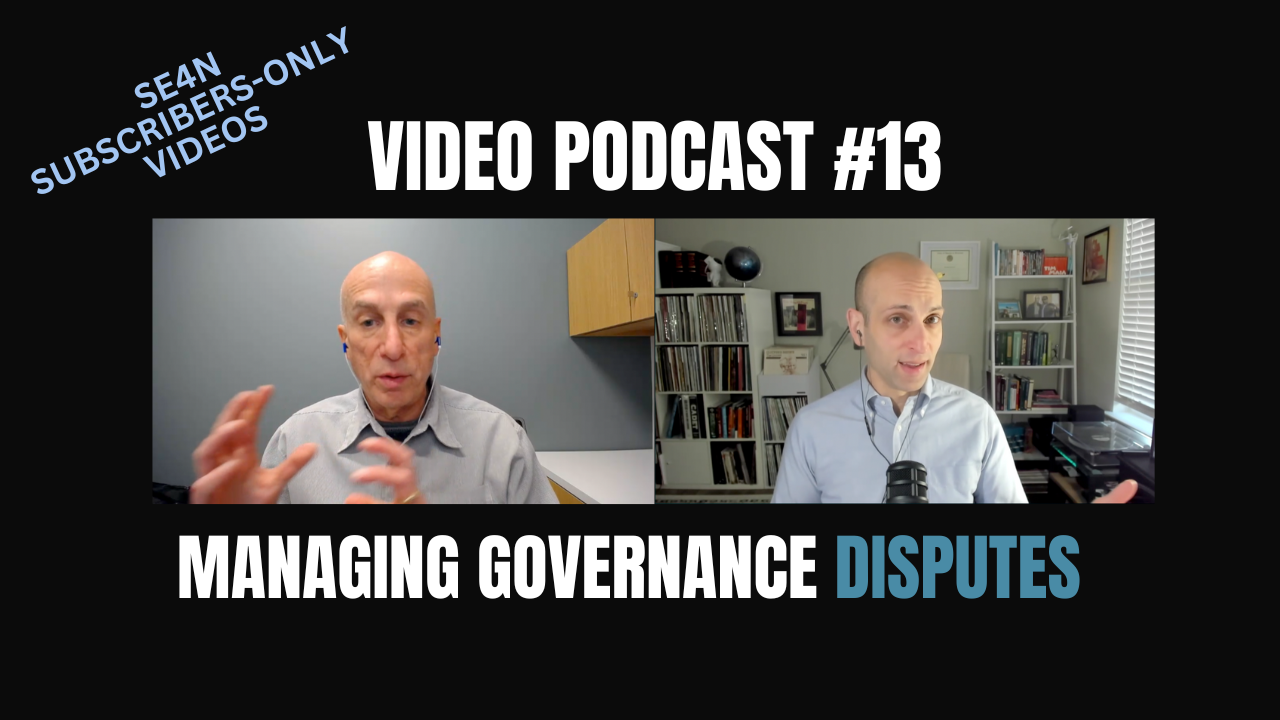
Blog.
Most Recent Posts

Q&A #171 – Can nonprofits rely on Form W-9 information when sending the Form 1099?
When issuing a Form 1099 (e.g., 1099-NEC), an organization is generally entitled to “reasonable reliance” on the information provided by a contractor or vendor in the Form W-9, provided the form was completely filled out, properly signed and dated, and not altered to remove required statements. However, an organization cannot rely on Form W-9 information the organization knows or has reason to know is incorrect. In that case, additional steps should be taken to verify the information.

VIDEO Q&A for Subscribers: January 2025
Ben and Mike answer questions from subscribers about how quickly a nonprofit Board of Directors must act to fill a vacant Board seat, how an organization can show a third party that it’s 501(c)(3) status is current and in good standing, the pros and cons of growing an organization through local chapters and affiliate structures, and the benefits of issuing an annual report for the general public to showcase an organization’s growth and successes.
![TEMPLATE: Model C Fiscal Sponsorship Agreement [SUBSCRIBERS-ONLY]](https://images.squarespace-cdn.com/content/v1/5e6ccadfb4659c1d51df14d5/0ae236df-0659-4b4a-9eb1-8660e6167467/aldo-terrazas-OaHkLW3GOz4-unsplash.jpg)
TEMPLATE: Model C Fiscal Sponsorship Agreement [SUBSCRIBERS-ONLY]
This template fiscal sponsorship agreement is intended for relatively straightforward “Model C” fiscal sponsorship relationships, sometimes called “indirect” fiscal sponsorship or a “pre-approved grant relationship.” This sample document covers key terms such as the fiscal sponsor’s variance powers, the allowable use of grant funds, reporting and recordkeeping requirements, termination of the relationship, and more.

VIDEO PODCAST: Managing Nonprofit Governance Disputes
Ben and Mike discuss how corporate governance disputes tend to arise in nonprofit organizations, how building a culture of open debate and discussion on the Board of Directors and throughout the organization can help prevent disputes from getting out of control, navigating D&O insurance and the decision whether to report a claim, considerations for managing disputes once they've arisen, and more.

Q&A #170 – Must nonprofits issue a Form 1099 for a contractor based in a foreign country?
In general, payments made by a nonprofit organization to consultants or contractors who qualify as “United States persons” under the Internal Revenue Code are subject to Form 1099 reporting, including U.S. citizens based abroad. Payments made to foreign persons are generally not subject to Form 1099 reporting but may be subject to withholding and reporting under Form 1042 and 1042-S.

VIDEO Q&A for Subscribers: December 2024
Ben and Mike answer questions from subscribers about implementing a CEO / Executive Director succession or transition plan, how to handle errors in an already-filed Form 990, planning for the possible loss in grant funding or a change in funding sources, and whether a person can old two officer positions simultaneously.
![TEMPLATE: Multi-Year Grant Usage Schedule [SUBSCRIBERS-ONLY]](https://images.squarespace-cdn.com/content/v1/5e6ccadfb4659c1d51df14d5/491e0b78-493c-4b0f-972c-01c1d4c1c289/pexels-muhammad-azhar-3401382-5085262.jpg)
TEMPLATE: Multi-Year Grant Usage Schedule [SUBSCRIBERS-ONLY]
Multi-year grants can be very beneficial to a nonprofit organization but can cause significant bottom-line budget (surplus and deficit) volatility. This template multi-year grant usage schedule will help to show the true impact of a grant over the full period of its use and move attention away from the impact on any one single fiscal year budget.

Enhancing the Nonprofit Treasurer Role and Relationship
Most treasurers for nonprofit organizations do not venture outside their traditional role of stewardship of the organization’s financial assets. Financial stewardship is important, but the perspective of the treasurer has value far beyond this singular role. Treasurers and the organizations they serve both need to correct this narrow perception and look for opportunities to expand the sphere of influence of this important officer position.

VIDEO PODCAST: Using Lines of Credit to Address Cash Flow Issues
Ben and Mike discuss lines of credit and other forms of debt, whether a line of credit can be an appropriate tool to help nonprofit organizations manage cash flow, some issues to consider before taking out a line of credit, and the importance of addressing the root causes of an organization's cash flow shortfall.

Q&A #169 – Must a Form 1099 be issued for a scholarship payment?
Despite common misconceptions, Treasury Regulations and Internal Revenue Service (IRS) guidance provide that most scholarship payments provided by nonprofit organizations are not required to be reported by the payor on Form 1099 (or Form W-2), regardless of whether the scholarship is a “qualified scholarship” or taxable to the recipient, so long as the primary purpose is to aid the student in pursuing their studies and not as compensation for past, present, or future services.

TEMPLATE: Short and Basic Grant Agreement
This short and basic grant agreement template is intended for situations involving relatively straightforward grants from one 501(c)(3) organization to another 501(c)(3) organization to fund a specific project or program. This sample document provides relatively concise language covering key terms such as the timing of grant payments, the allowable use of grant funds, reporting and recordkeeping requirements imposed on the recipient organization, and more.
![VIDEO Q&A for Subscribers: November 2024 [PREVIEW]](https://images.squarespace-cdn.com/content/v1/5e6ccadfb4659c1d51df14d5/baccfbcd-ed95-49ed-b154-0bfec7efbc71/SE4N+Video+Q%26A+2024-11.png)
VIDEO Q&A for Subscribers: November 2024 [PREVIEW]
Ben and Mike answer questions from subscribers about the spending of operating reserves, conflicts of interest related founders of a nonprofit becoming staff, deciding between filing the Form 990-EZ and the Form 990, and legal issues raised by the moving of funds between related organizations.

VIDEO PODCAST: Assessing Independent Contractor vs. Employee Status
Mike and Ben discuss the legal standards for determining whether a nonprofit organization is permitted to a treat a worker as an independent contractor rather than an employee, the risks of worker misclassification and the different ways this issue can come to light, the reformulated IRS “20-factor” test, common mistakes and misconceptions about these rules, and more.

Q&A #168 – Is a newly formed nonprofit required to file Form 990-N for its first short tax year?
Most nonprofit organizations are required to submit a federal tax filing for their first partial or short tax year even if their tax-exempt status has not yet been approved, but there is no monetary penalty for failure to file if the organization qualifies to file the Form 990-N (e-postcard). Nonetheless, it is usually prudent to file Form 990-N for the first tax year anyway.
![Five Ways Nonprofit Board Actions Can Be Challenged Under Law [SUBSCRIBERS-ONLY]](https://images.squarespace-cdn.com/content/v1/5e6ccadfb4659c1d51df14d5/1730307595287-W3L74FMFRZEHZ01AZV15/pexels-zachary-caraway-646894910-17630959.jpg)
Five Ways Nonprofit Board Actions Can Be Challenged Under Law [SUBSCRIBERS-ONLY]
It is well-known that Board members are subject to fiduciary duties in their oversight and decision-making role, among other rules that apply to nonprofit organizations. However, the practical reality of how these requirements are scrutinized, applied, and enforced is less understood. This article provides a brief overview of some common ways that Board decisions and actions could be challenged in court.